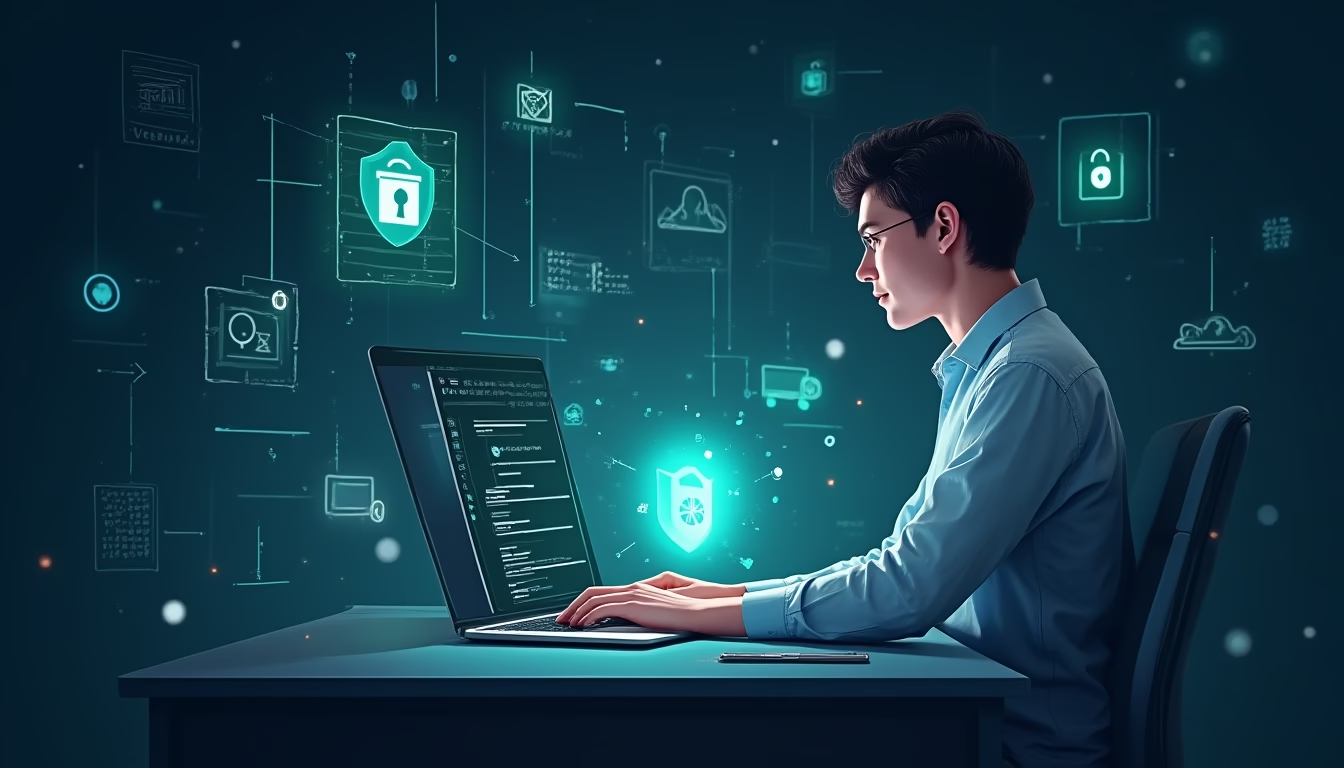Data Security & Trust: Ensuring Your Business Information is Safe with a Remote VA
Data Security & Trust: Ensuring Your Business Information is Safe with a Remote VA
Imagine this: You’re a small business owner, ready to scale. The idea of delegating tasks to a virtual assistant is incredibly appealing – freeing you up to focus on strategy and growth. But then, a wave of apprehension washes over you. How can you really trust someone you haven’t met in person with your sensitive business data? Financial records, client information, website code… the risks seem daunting.
The rise of remote VAs has been meteoric, offering businesses of all sizes unparalleled flexibility and cost savings. However, this convenience comes with a critical caveat: the absolute necessity of robust data security. Sharing crucial business information with a remote worker inherently introduces vulnerabilities.
Data breaches, malware attacks, accidental data loss – these are just some of the potential pitfalls. The thought of non-compliance with data privacy regulations like GDPR or CCPA adds another layer of complexity. The question is: how do you navigate this landscape and protecting business data with a VA?
This post aims to reassure you that data security is achievable when working with a remote VA. Through careful planning, diligent implementation of best practices, and a strong foundation of trust and transparency, you can confidently leverage the benefits of remote assistance. We’ll delve into vital strategies for protecting business data with a VA, focusing on VA security best practices and ensuring virtual assistant data security.
Understanding Data Security Risks with Remote VAs
Data security in the remote work context goes beyond simply having a strong password. It encompasses a holistic approach to safeguarding all types of information, especially those most vulnerable. This includes financial data, customer details, intellectual property (your website’s code, proprietary designs, etc.), and any other sensitive information that could harm your business if compromised.
Remote work introduces new challenges because it often involves different networks (potentially unsecured home Wi-Fi), personal devices, and diverse locations. This expanded attack surface increases the risk of various threats:
- Data Breaches and Unauthorized Access: A VA’s device could be compromised, leading to unauthorized access to your data.
- Malware and Phishing Attacks: VAs, like any employee, are susceptible to phishing emails and malware infections.
- Accidental Data Loss or Corruption: Human error can lead to accidental deletion or corruption of critical files.
- Non-Compliance with Data Privacy Regulations: Failure to comply with regulations like GDPR or CCPA can result in hefty fines.
- Risk of Data Misuse: While hopefully rare, the risk of a VA intentionally misusing your data is a real concern.
Beyond the technical aspects, trust is paramount. Data security is not solely about firewalls and encryption; it’s also about establishing clear expectations, open communication, and a mutual understanding of the importance of confidentiality. A significant portion of security comes down to the people you are trusting with your information.
Legally, various data protection laws, such as GDPR (if you handle EU citizens’ data) and CCPA (California Consumer Privacy Act), mandate specific security measures. Compliance is crucial to avoid legal repercussions. Understanding these risks is the crucial first step toward mitigating them.
Essential VA Security Best Practices
Mitigating the risks associated with remote VAs requires a proactive and multi-layered approach. Implementing these VA security best practices is crucial for virtual assistant data security.
Due Diligence in VA Selection
The foundation of a secure working relationship starts with careful VA selection. Don’t rush the hiring process. Take the time to:
- Conduct Background Checks: Consider a professional background check, where appropriate and permitted by law.
- Check References and Online Reviews: Reach out to previous clients and scrutinize online reviews for any red flags.
- Assess Data Security Knowledge: Ask questions about their experience with data security protocols and tools. Gauge their understanding of security best practices.
- Discuss Security Protocols Before Hiring: Clearly communicate your security expectations and requirements upfront. This allows you to gauge their willingness to comply and their understanding of the importance of data security.
Strong Contracts and Non-Disclosure Agreements (NDAs)
A well-drafted contract and NDA are essential legal safeguards. Ensure they clearly define:
- Data Ownership and Confidentiality: Explicitly state that you own all data and that the VA is obligated to keep it confidential.
- Permitted Data Usage: Clearly specify how the VA is allowed to use the data and what activities are prohibited.
- Consequences of Data Breaches: Outline the repercussions of any data breach or security violation, including potential legal action.
Secure Data Access and Storage
Implement robust security measures to control data access and storage:
- Password Management Best Practices: Mandate the use of strong, unique passwords and a reputable password manager (e.g., LastPass, 1Password).
- Multi-Factor Authentication (MFA): Enforce MFA for all accounts, adding an extra layer of security beyond just a password.
- Secure Cloud Storage Platforms: Utilize secure cloud storage platforms like Google Drive or Dropbox with granular access controls, limiting access to specific folders and files based on need.
- Data Encryption: Encrypt sensitive data both at rest (when stored) and in transit (when being transmitted).
- Limit Access to Sensitive Data: Implement the principle of least privilege, granting access to only the data that the VA absolutely needs to perform their tasks.
Secure Communication Channels
Protect communication channels to prevent eavesdropping and data interception:
- Encrypted Email Services: Consider using encrypted email services like ProtonMail or Tutanota for sensitive communications.
- Secure Messaging Apps: Opt for secure messaging apps like Signal or WhatsApp (with end-to-end encryption) for instant messaging.
- Avoid Unsecured Channels: Never share sensitive information over unsecured channels like standard email or public Wi-Fi.
Device Security
Ensure the VA’s devices meet minimum security standards:
- Secure and Updated Operating System: Require the VA to use a secure and updated operating system with the latest security patches.
- Antivirus and Anti-Malware Software: Mandate the installation and regular updating of reputable antivirus and anti-malware software.
- Clear Device Usage Guidelines: Establish clear guidelines for device usage, prohibiting activities like using public Wi-Fi for sensitive tasks or installing unauthorized software.
Data Backup and Recovery
Implement a robust data backup and recovery plan:
- Regular Data Backups: Regularly back up important data to a secure, offsite location.
- Test Recovery Process: Periodically test the recovery process to ensure it works effectively.
Monitoring and Auditing
Implement systems to monitor data access and usage and regularly audit security practices:
- Data Access Monitoring: Track who is accessing what data and when.
- Regular Security Audits: Conduct periodic audits of security protocols and make necessary adjustments.
By securely working with a virtual assistant and implementing these measures, you can significantly reduce your risk.
Building Trust and Maintaining Confidentiality
While technical safeguards are crucial, they are only part of the equation. Building trust and fostering a culture of security are equally important for maintaining virtual assistant confidentiality.
Open Communication and Transparency
Establish a foundation of open communication and transparency:
- Regular Check-ins and Feedback Sessions: Conduct regular check-ins to discuss progress, address concerns, and provide feedback.
- Clearly Defined Expectations and Responsibilities: Ensure the VA understands their responsibilities and the expectations for data security.
- Encourage Reporting of Security Concerns: Encourage the VA to report any security concerns or suspicious activity without fear of reprisal.
Establishing a Culture of Security
Cultivate a security-conscious environment:
- Ongoing Security Training: Provide ongoing security training to the VA to keep them up-to-date on the latest threats and best practices.
- Reinforce Importance of Data Security: Regularly reinforce the importance of data security and confidentiality.
Regular Security Audits and Reviews
Periodically review and update security protocols:
- Review Security Protocols: Periodically review security protocols and make necessary updates based on evolving threats and best practices.
- Ensure Compliance: Ensure the VA understands and complies with all security policies.
Building a strong relationship with your VA can foster loyalty and a sense of responsibility toward protecting your data. When a VA feels valued and respected, they are more likely to take data security seriously.
Overcoming Challenges and Addressing Concerns
Implementing robust data security measures can feel overwhelming, especially for small businesses. Here are some common objections and solutions:
- “I can’t afford to implement all these security measures.” Highlight cost-effective solutions such as free password managers, open-source encryption tools, and basic security training resources. Start with the most critical vulnerabilities and gradually implement more comprehensive measures.
- “I don’t have the technical expertise to manage data security.” Suggest readily available resources such as online security courses, cybersecurity consultants (even for a short consultation), and user-friendly security tools.
- “I don’t know where to start.” Offer a step-by-step guide, starting with a risk assessment, followed by implementing basic security measures like strong passwords and MFA, and then gradually building upon that foundation.
Finding the right VA with the right security mindset is critical. Look for VAs with proven security credentials or training, or those who demonstrate a strong understanding of data security principles. Don’t be afraid to ask tough questions during the interview process to assess their knowledge and commitment to security.
Data security is an ongoing process, not a one-time fix. Continuously monitor your security posture, update your protocols as needed, and stay informed about emerging threats.
Conclusion
In conclusion, virtual assistant data security is paramount. By understanding the risks, implementing VA security best practices, building trust, and maintaining open communication, you can confidently leverage the benefits of remote assistance. Prioritizing data security and cultivating a strong relationship with your VA allows you to maximize efficiency without compromising the safety of your valuable information. Securely working with a virtual assistant is possible, and it provides a competitive edge.
Remember, working with a remote VA can be a strategic advantage, but only if data security is taken seriously.
The VA should also understand the importance of virtual assistant confidentiality.
Call to Action
What are your biggest data security concerns when working with a remote VA? Share your thoughts and experiences in the comments below.
Download our free checklist for securing your business data with a remote VA [Link to Checklist – TBD].
Learn more about password management best practices.
If you’re ready to consider working with a VA, let’s see how can I help you scale your business.






